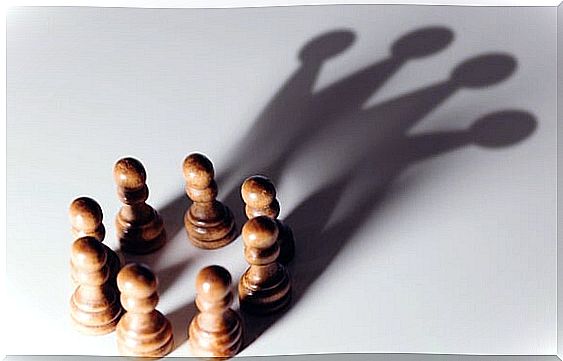5 Cognitive Biases That Favor The Powerful

The human mind is truly amazing. Not only because of what she is capable of creating and learning, but because of the many ways in which she can deceive herself. We are more imagination and emotion… what a reason. In part, this is what causes us to incorporate different cognitive biases into our thought processes. Biases that, on the other hand, are often conditioned by those who have, or want to have, power for their benefit.
Thinking in a rational way requires effort, preparation and having reliable sources of information. Also, people tend rather to be guided by our sympathies, tastes, fears, etc. Many times we do not question an idea -especially if it is consistent with what we already thought-, but rather we approve or disapprove because we “feel” that it is better that way. This is a clear example of how cognitive biases operate.
During political elections, and also in the exercise of power , many use these cognitive biases to manipulate people’s opinions. They lead us to believe that something good only for a minority is good for everyone. Or vice versa. Let’s look at 5 of those control mechanisms.
1. Karma bias
This is one of the most destructive cognitive biases, because it leads to great injustices. It consists of an erroneous and simplistic interpretation of the principle of action and reaction. It is assumed that something cannot happen to someone if they have not taken some action to make it happen.
In this way, one comes to think that whoever finds himself in a bad situation, is because he deserves it. The poor man is guilty of his poverty, the victim of aggression, the patient of his pain, etc. Although there is no data to confirm this, in a prejudicial way there is a tendency to consider that “something is” behind each person in a bad situation. In addition, this bias is favored because it gives us the feeling of being in a more controllable world, so that we can always do something to not end up like them. In other words, this bias incorporates an intrinsic reinforcer to the bias itself that tends to perpetuate it.
2. Confirmation bias
Confirmation bias consists of giving credence only to data that confirms our already established beliefs. In this case, the source of these data is not evaluated or contrasted with others that are different. A more or less blind adhesion is simply practiced. Let’s think that this bias also carries an intrinsic reinforcer: it favors, at least in the first instance, our cognitive economy.
This applies particularly to the choice of a political party or a religion. These beliefs are generally inherited and are never questioned. No other positions are known, but it is automatically assumed that one’s belief is correct. For this reason, only the data that ratify it are considered valid.
3. Framing effect
This is one of the cognitive biases that are directly related to the media. It has to do with the tendency to draw different conclusions, depending on how we access the information or how it is presented to us.
A classic example is this: “More than 30% do not agree with Paco. ” Thus, instead of saying that around 70% of the people share Paco’s ideas, the emphasis is on disagreement. In this way, it is given a more negative than positive connotation.

4. Illusory correlation
The illusory correlation is the tendency to establish links between two variables although objectively said association does not exist. In this way, two realities are associated, based on little valid elements. Generally it tries to cover up some situation or to build an illusion of truth.
A very frequent example of this is when structural events are associated with specific events, with which they are unrelated. For example, say that prosperity began when the ruling “x” came to power, without taking into account that an oil field was discovered in the country during that period. The source of progress is not the ruler, but the discovery of the mineral. The reverse is also the case.
5. Sunk cost
This is also one of the most damaging cognitive biases, because it is at the root of intolerance. It consists in that we attach ourselves to ideas as if they were part of ourselves.
That is why we assume that the cost of changing your mind is very high. On the one hand, it implies stripping ourselves of something that we consider “ours”. We see it as loss. On the other hand, it involves a lot of effort. Undoing ideas and understanding new ways of seeing things is a fascinating exercise, but often also arduous.

It is very important that we know these cognitive biases to detect them and modulate their influence on our train of thought. On the other hand, the best way to do it is by informing ourselves well. This means looking for reliable and neutral sources. Also analyze and properly digest everything that emerges from interested sources. Particularly from the figures of power.









